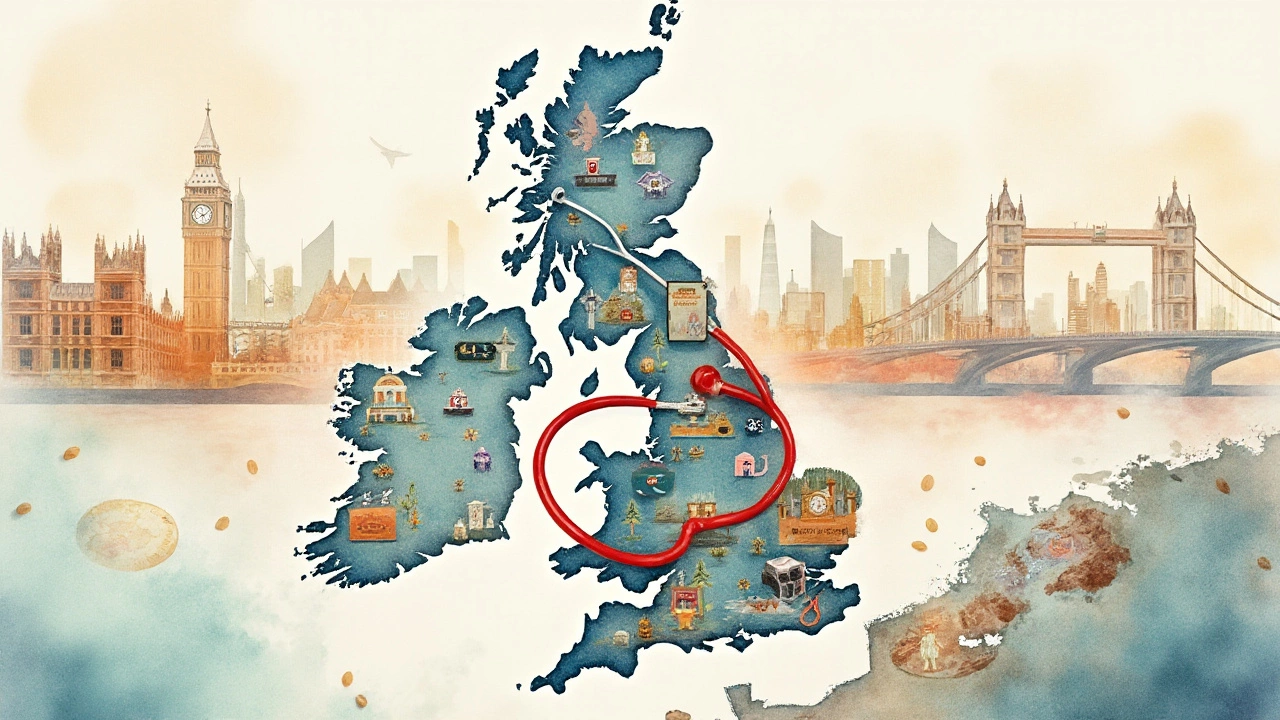UK Healthcare Costs: What You Really Pay for Health Care in 2025
Ever wonder why your medical bill looks the way it does? In the UK, the picture is a mix of free NHS services, private insurance premiums, and hidden charges for things like dental work or prescription fees. Understanding the pieces helps you plan better and avoid nasty surprises at the pharmacy or the dentist.
How the NHS Shapes Your Wallet
The NHS covers most doctor visits, hospital stays, and emergency care at no direct cost. That sounds great, but the system runs on taxes, and the pressure shows up in waiting lists. In 2025, typical waiting times for elective surgery can stretch from a few weeks to several months. If you can’t wait, private care becomes an tempting shortcut, but it comes with its own price tag.
Waiting lists aren’t just about time; they translate into indirect costs. A delayed knee replacement, for example, may mean lost wages, temporary painkillers, and extra physiotherapy sessions. Knowing the average waiting period for your procedure helps you decide whether private treatment is worth the extra spend.
Private Health Insurance: Is It Worth the Money?
Private health insurance in the UK now averages around £150‑£200 per month for a basic adult plan. Premiums rise if you add dental cover, vision, or a higher cash‑out limit. The big draw is faster access to specialists and the freedom to choose hospitals. If you have a chronic condition that needs regular scans, the shorter wait can actually save money in the long run.
When you compare costs, don’t forget the extra fees that come with private hospitals – things like anaesthetic surcharges or post‑op care packages. Some insurers bundle these in, while others charge per procedure. Look at the fine print and ask for a clear breakdown before you sign up.
For foreigners visiting the UK, the NHS offers free emergency care, but routine treatments usually require travel insurance or a private plan. Tourists should check if their home insurance covers UK medical services, or they can buy short‑term NHS visitor coverage for a few weeks.
Dental work is another hidden expense. Even with an NHS dentist, you’ll pay a standard charge for most procedures, and many people turn to private dentists to avoid long waits. Prices abroad can be a fraction of UK rates, but you must weigh the travel cost and quality assurance.
If you’re trying to keep costs down, consider these practical steps:
- Use NHS prescription pre‑payment certificates if you need multiple meds each month.
- Check if your employer offers health cash plans that cover dental and optical services.
- Monitor waiting list stats for your region – some trusts have shorter queues.
- Shop around for private insurance and use comparison tools to spot hidden fees.
- When possible, schedule routine check‑ups during off‑peak times to avoid extra charges.
Bottom line: UK healthcare costs aren’t just a single number. They’re a mix of taxes, insurance premiums, waiting times, and out‑of‑pocket fees. Knowing where each cost comes from lets you make smarter decisions, whether you stick with the NHS, go private, or blend both.
How much does it cost to see a doctor without insurance in the UK?
Seeing a doctor without insurance in the UK costs nothing if you're eligible for NHS care. For those who aren't, private GP visits range from £50 to £120, with extra fees for tests and prescriptions. Learn how to avoid unexpected bills.
Understanding Monthly Health Insurance Costs in the UK
Navigating the landscape of monthly health insurance costs in the UK can be a complex task. From understanding what affects premiums to examining the benefits of going private, this guide sheds light on the intricacies of the British healthcare insurance system. Knowing the factors that influence costs and the available options can help UK residents make informed decisions about their healthcare. Additionally, valuable tips are provided to reduce expenses while maintaining adequate coverage.
Understanding the Costs of Healthcare in the UK: What Citizens Pay
The UK healthcare system, primarily through the NHS, offers many services without direct charges for citizens, funded predominantly by taxation. However, there are specific areas where individuals incur costs, such as dental services, prescriptions, and certain elective procedures. This article delves into the nuances of what UK citizens typically pay for their healthcare and offers insights into optional health insurance policies. It also provides tips for managing these costs effectively.



